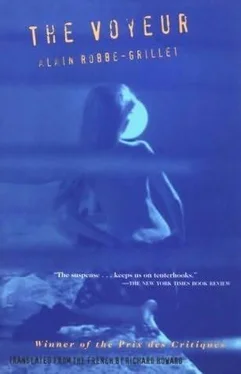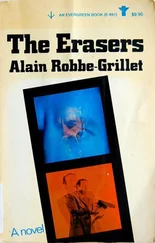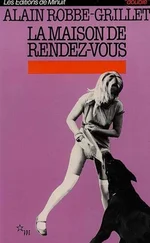Mathias walks straight ahead; the moist air refreshes his forehead and his eyes. The carpetlike vegetation along this part of the coast is so full of water that the soles of his shoes sound like sponges being squeezed. Walking on this elastic, half-liquid soil is easy and spontaneous—whereas last night his feet were constantly bumping into invisible stones along the way. This morning, all the salesman’s fatigue has vanished.
He reaches the edge of the cliff almost immediately; it is quite low in this area. The tide is still ebbing. The sea is perfectly calm. The regular hiss of the waves is scarcely louder than the sound of his shoes in the grass, but slower. To the left can be seen the long, rectilinear pier sticking out at an angle toward the open sea, and at its tip the beacon-light turret indicating the entrance to the harbor.
Continuing in this direction, sometimes on the moor, sometimes on the rocks themselves, Mathias’ progress is hindered by a long crevice running perpendicular to the shoreline. It is no more than a yard wide at the top, narrowing below until it is too restricted for anything larger than the body of a child to slip through. But the crevice must penetrate much deeper into the rock; the various outcroppings along the sides make it impossible to see to the bottom. Instead of widening as it approaches the sea, the crevice narrows still more—at least on the surface—and offers, along the cliffside, no practicable opening in the chaos of granite blocks extending as far as the beach. It is therefore impossible to slip into it at any point.
Mathias takes the bag of gumdrops out of his pocket, opens it, inserts a pebble for ballast, twists the cellophane neck several times, and drops it where the crevice seems least choked. The object bumps against the stone sides once, then again, but without being damaged or obstructed in its fall. Then it disappears from sight, swallowed by distance and darkness.
Leaning over the crevice, his ears straining, Mathias hears it ricochet a third time against something hard. A characteristic noise, immediately afterward, indicates that the body has ended its course in a hole full of water. The latter doubtless communicates with the open sea at high tide, but by channels too narrow and complicated for the undertow ever to bring the little bag to light. Mathias straightens up, makes a detour in order to bypass the crevice, and continues his interrupted walk. He wonders if crabs like gumdrops.
Soon the flat rocks on which the beginning of the big pier is constructed are at his feet—sloping reaches of gray stone that extend to the water without the least bit of beach, even at low tide. Here the customs path joins a more important road to the interior, turning away from the shore at an old, half-razed wall, apparently the remains of the ancient royal city.
Mathias climbs down the rocks without difficulty, owing to their convenient arrangement. In front of him rises the outer wall of the pier, extending vertically and rectilinearly toward the beacon light.
He climbs down the last slope, then up the few steps leading to the quay by the opening cut into the massive parapet. He finds himself once again on the rough pavement, new-washed by the morning’s rain. The harbor is as smooth as a frozen pond: not the slightest undulation, not the slightest ripple at the edge, not the slightest tremor on the surface. At the end of the pier, moored against the landing slip, a small trawler is loading crates. Three men—two on the pier, one on the deck—laboriously pass them from hand to hand.
The strip of mud exposed below the quay no longer looks the same as on the preceding days. Mathias nevertheless has to think several seconds before he realizes the nature of the change, for nothing strikes the eye as extraordinary in this grayish-black expanse: it is merely “clean”—all the debris which previously covered it has been removed at one stroke. Mathias actually recalls having noticed, the day before, a group of men raking here at low tide. The proprietor had remarked that certain habits of cleanliness had been maintained on the island ever since the naval occupation. The salesman had pretended, of course, to remember something of the kind from his earliest childhood; but in reality he had completely forgotten this detail, along with all the rest, and such images awakened no response.
Remains of shellfish, pieces of iron or crockery, half-rotten seaweed—everything has disappeared. The sea has smoothed out the layer of mud, and as it retreats, leaves behind a shining, immaculate beach from which emerge here and there only a few solitary rounded stones.
As soon as he enters the café, the proprietor calls out to Mathias; there is a chance for him to return to the city without waiting for the boat tomorrow night. A trawler—the one at the landing slip—will be leaving in a little while for the mainland; in spite of the strict regulations, the captain has agreed to take him as a passenger. Mathias looks through the glass door at the little blue boat still being loaded in the same laborious fashion.
“The captain is a friend of mine,” the proprietor says. “He’ll do it for you as a favor.”
“Thank you very much. But I have my return ticket. It’s still good—I don’t want to waste it.”
“They won’t ask much, don’t worry about that. Maybe the steamship line will refund your money anyway.” Mathias shrugs his shoulders. His eyes are following the silhouette of a man walking down the pier, coming from the landing slip.
“I don’t think so,” he says. “And I’d have to get on board right away, probably, wouldn’t I?”
“You’ve still got a good quarter of an hour: plenty of time to get your things together.”
“But not time to have lunch too.”
“I can give you a quick cup of coffee.”
The proprietor bends over the open cupboard to take out a cup, but Mathias stops him with a gesture of his hand and makes a face: “If I can’t take my time over a good cup of café au lait with two or three rolls and butter, I’m not good for anything.”
The proprietor lifts his arms and smiles, a sign that in that case he can do nothing more. Mathias turns his head toward the glass door. The fisherman in red clothes walking along the pier seems to have stayed in the same place while he was not looking; yet his regular pace must have brought him noticeably closer during these last remarks. It is easy to check his progress by means of the baskets and fishing tackle along the route. As Mathias watches him, the man quickly leaves these reference points behind, one after the other.
Mathias smiles back at the proprietor and adds: “Besides, I have to go and pay for my room. My landlady probably won’t be home now.”
A glance through the glass door affords him the same surprise: the fisherman is at exactly the same place he appeared to occupy a moment before, when Mathias’ eyes had left him, still walking with the same even, rapid pace between the nets and traps. As soon as the observer stops watching him he stands still, continuing his movement at the very moment Mathias’ eyes return to him—as if no interruption had occurred, for it is impossible to see him either start or stop.
“It’s your business,” the proprietor says. “If you want to stay with us so badly…. I’ll bring you something right away.”
“Thank you. I’m hungry this morning.”
“I’m not surprised! You didn’t eat anything last night.”
“I’m usually hungry in the morning.”
“In any case, nobody can say you don’t like the country around here! You’d think you were afraid of missing a day of it.”
“Oh, I know the country quite well—I’ve known it for a long time. Didn’t I tell you I was born here?”
“You had plenty of time to drink a cup of coffee and get your things. As for the money, you’ll spend more staying here.”
Читать дальше












